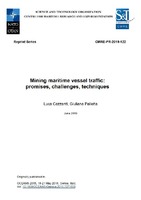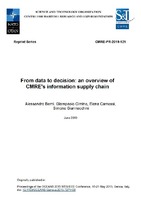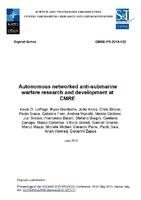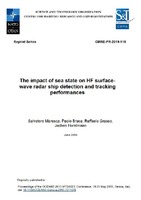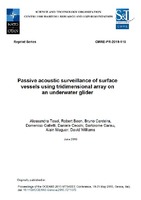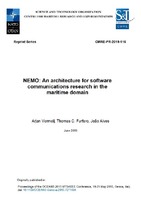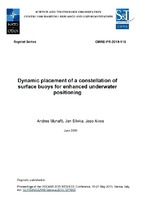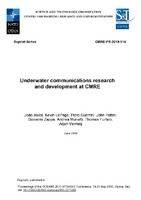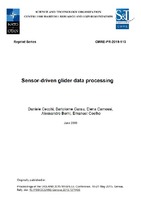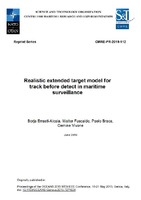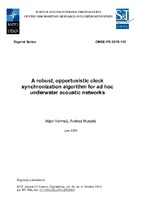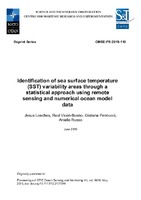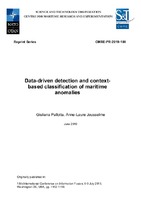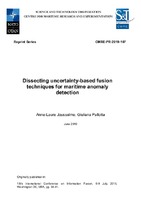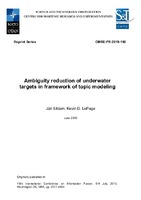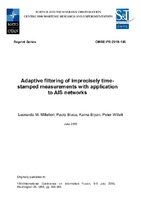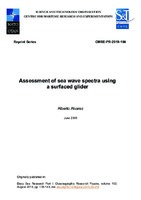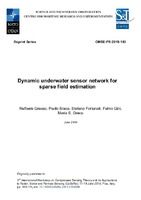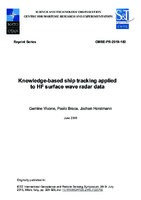Reprints: Recent submissions
Now showing items 21-40 of 548
-
Mining maritime vessel traffic: promises, challenges, techniques
(CMRE, 2019/06)This paper discusses machine learning and data mining approaches to analyzing maritime vessel traffic based on the Automated Information System (AIS). We review recent efforts to apply machine learning techniques to AIS ... -
From data to decision: an overview of CMRE's information supply chain
(CMRE, 2019/06)Proper data curation is a prerequisite for the creation of long-lasting value from scientific datasets and for the generation of authoritative data-driven decision support tools. Availability of detailed information on ... -
Autonomous networked anti-submarine warfare research and development at CMRE
(CMRE, 2019/06)CMRE has been evaluating the potential of autonomous networked ASW using underwater vehicles through a program of sonar signal processing, underwater communications, navigation and robotic behavior developments and at-sea ... -
The impact of sea state on HF surface-wave radar ship detection and tracking performances
(CMRE, 2019/06)Nowadays, we face an ever increasing interest in new technologies and solutions for the maritime surveillance (MS) domain. In such a context, oceanographic high-frequency surface-wave (HFSW) radars have started to get ... -
Passive acoustic surveillance of surface vessels using tridimensional array on an underwater glider
(CMRE, 2019/06)The NATO-STO Centre for Maritime Research and Experimentation (CMRE) has proposed to approach the problem of monitoring marine traffic in defined sea areas by using passive acoustics on a mobile underwater platform, in ... -
Towards fully autonomous underwater vehicles in ASW scenarios: an adaptive data driven AUV mission management layer
(CMRE, 2019/06)We present an adaptive, data driven Mission Management Layer (MML) to manage the phases (surveillance, track prosecution and target reacquisition) of the mission of AUVs operating as receiver nodes in a multistatic network ... -
NEMO: An architecture for software communications research in the maritime domain
(CMRE, 2019/06)This paper presents a high-level overview of NEMO, an implementation of a communications research software workspace with special focus on application scenarios involving underwater (e.g. acoustic), and other maritime ... -
Dynamic placement of a constellation of surface buoys for enhanced underwater positioning
(CMRE, 2019/06)This paper addresses the challenge of dynamically adapting the location of the nodes in an acoustic network to optimise the localisation performance of Autonomous Underwater Vehicles (AUVs) operating in the area. A dynamic ... -
Underwater communications research and development at CMRE
(CMRE, 2019/06)A key to developing autonomous maritime systems for NATO is communication among data gathering platforms below and above the water. However, unlike the mature technologies that are used for terrestrial networks, underwater ... -
Sensor-driven glider data processing
(CMRE, 2019/06)Gliders data are an important source of observations for oceanographers, hence harmonization and interoperability among different acquisition systems are key enablers towards efficient data sharing and effective reuse. As ... -
Realistic extended target model for track before detect in maritime surveillance
(CMRE, 2019/06)Traditional target tracking algorithms are generally fed a set of thresholded detections under the hypothesis that no more than one detection is generated by each single target. Improvements in modern radar systems have ... -
A robust, opportunistic clock synchronization algorithm for ad hoc underwater acoustic networks
(CMRE, 2019/06)The proliferation of deployed sea-going autonomous platforms, such as autonomous underwater vehicles (AUVs), unmanned surface vehicles (USV), and sensor nodes anchored to the seabed, makes the deployment of true underwater ... -
Identification of sea surface temperature (SST) variability areas through a statistical approach using remote sensing and numerical ocean model data
(CMRE, 2019/06)An understanding of environmental variability (stability/instability) is important to support operational planning of expeditionary warfare and littoral operations, as well as for preparing the Recognized Environmental ... -
Data-driven detection and context-based classification of maritime anomalies
(CMRE, 2019/06)Discovering anomalies at sea is one of the critical tasks of Maritime Situational Awareness (MSA) activities and an important enabler for maritime security operations. This paper proposes a data-driven approach to anomaly ... -
Dissecting uncertainty-based fusion techniques for maritime anomaly detection
(CMRE, 2019/06)Detecting and classifying anomalies for Maritime Situation Awareness gets a lot of benefit from the combination of multiple sources, correlating their output for detecting inconsistencies in vessels' behaviour. Adequate ... -
Ambiguity reduction of underwater targets in framework of topic modeling
(CMRE, 2019/06)An unsupervised track classification approach based on appropriate discriminative and aggregative features derived from beamformed and normalized matched-filtered data is applied to sonar multistatic tracking and extended ... -
Adaptive filtering of imprecisely time-stamped measurements with application to AIS networks
(CMRE, 2019/06)Driven by real-world issues in maritime surveillance, we consider the problem of estimating the target state from a sequence of observations that can be imprecisely time-stamped. That is, the time between two consecutive ... -
Assessment of sea wave spectra using a surfaced glider
(CMRE, 2019/06)The determination of non-directional and directional sea wave spectra is attempted by analysing the dynamical response of a surfaced Slocum glider. The method makes use of the glider heave motion to infer non-directional ... -
Dynamic underwater sensor network for sparse field estimation
(CMRE, 2019/06)A coordinated dynamic network of autonomous underwater gliders to estimate 3D environmental sparse fields is proposed and tested. Field spatial sparsity is exploited in the estimation algorithm. Moreover field measurements ... -
Knowledge-based ship tracking applied to HF surface wave radar data
(CMRE, 2019/06)In recent years, low-power high-frequency surface-wave radars have received significant attention thanks to their over-the-horizon coverage capability and the continuous-time operation mode. These radars have become effective ...
